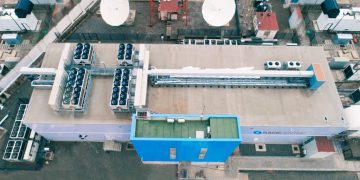Nigeria, with just 14 data centres nationwide, is struggling to meet the increasing demand for data storage. In response, Citidata Centre plans to construct six Tier III edge data centres in Lagos and Ogun states over the next two years. These smaller, agile facilities will serve as a cost-effective solution for a price-sensitive market while bringing data centres closer to users and their devices.
Edge data centres are compact facilities located near users and their devices, offering low capacity but significant advantages in terms of speed, efficiency, and affordability. Unlike large data centres that demand megawatts of power, edge centres typically operate with smaller power needs, keeping costs low for both operators and clients.
According to Andie Moyan, CEO of Citidata Centre, the focus is not just on building large-scale capacity, but on enhancing data processing power where it matters most—near the end-users.
“The immediate need isn’t just for large-scale capacity, but for processing power that is closer to end-users,” Moyan told TechCabal.
Citidata’s flagship facility in Ogun state, which went live on July 15, 2024, started with a 30-rack capacity and plans to expand to 80 racks. Its location in Ogun state, outside of Lagos, is a strategic move designed for disaster recovery and business continuity. This ensures that businesses and government entities based in Lagos can back up their critical data in another state. A disruption such as a cyberattack or power outage in Lagos would not affect companies with backup systems in Ogun.
“Having a data centre in Ogun State is good business for disaster recovery for companies based in Lagos, especially government guys. They like to use different states,” a data centre expert said.
In addition to the Ogun site, five more edge facilities are planned for Lagos by 2027. These centres will be strategically located in commercial areas such as Ajao Estate, Surulere, Lagos Island, Victoria Island, and Lekki. Each will have a capacity of fewer than 100 racks, allowing Citidata to keep the facilities adaptive and cost-effective while reducing data transfer times for local businesses.
Citidata’s plans are supported by key partnerships. TopTech Engineering Limited will be responsible for building the data centres, having previously worked with Huawei on other data centre projects. Petrodata Management Services, with experience managing edge data centres in Lagos and Abuja for oil and gas clients, will oversee the facilities.
Over the past decade, global data centre capacity has experienced explosive growth, driven by the escalating demand for internet connectivity from over 5.45 billion users worldwide. This surge has sparked intense competition for data storage infrastructure, particularly data centres.
The United States leads the global data centre landscape with an impressive 5,388 facilities and over 1,000 MW of capacity. Germany, the UK, China, and Canada follow closely, boasting 522, 517, 449, and 336 data centres, respectively.
In contrast, Africa trails significantly, with only 119 data centres. South Africa leads with 39 data centres, while Nigeria has just 14. In terms of capacity, South Africa dominates, accounting for 400 MW of Africa’s total 480 MW, with Nigeria contributing a modest 64 MW.
Citidata’s focus on edge data centres reflects a broader strategy to address the challenges of affordability and accessibility in Nigeria’s growing digital economy.
“We believe that fostering local assembly and partnerships is essential for building a sustainable ecosystem that can support Nigeria’s digital transformation,” the company said.
As Nigeria works to close the data centre gap with leading countries like South Africa, these local initiatives will be crucial in providing the infrastructure needed to support the country’s digital growth.























































